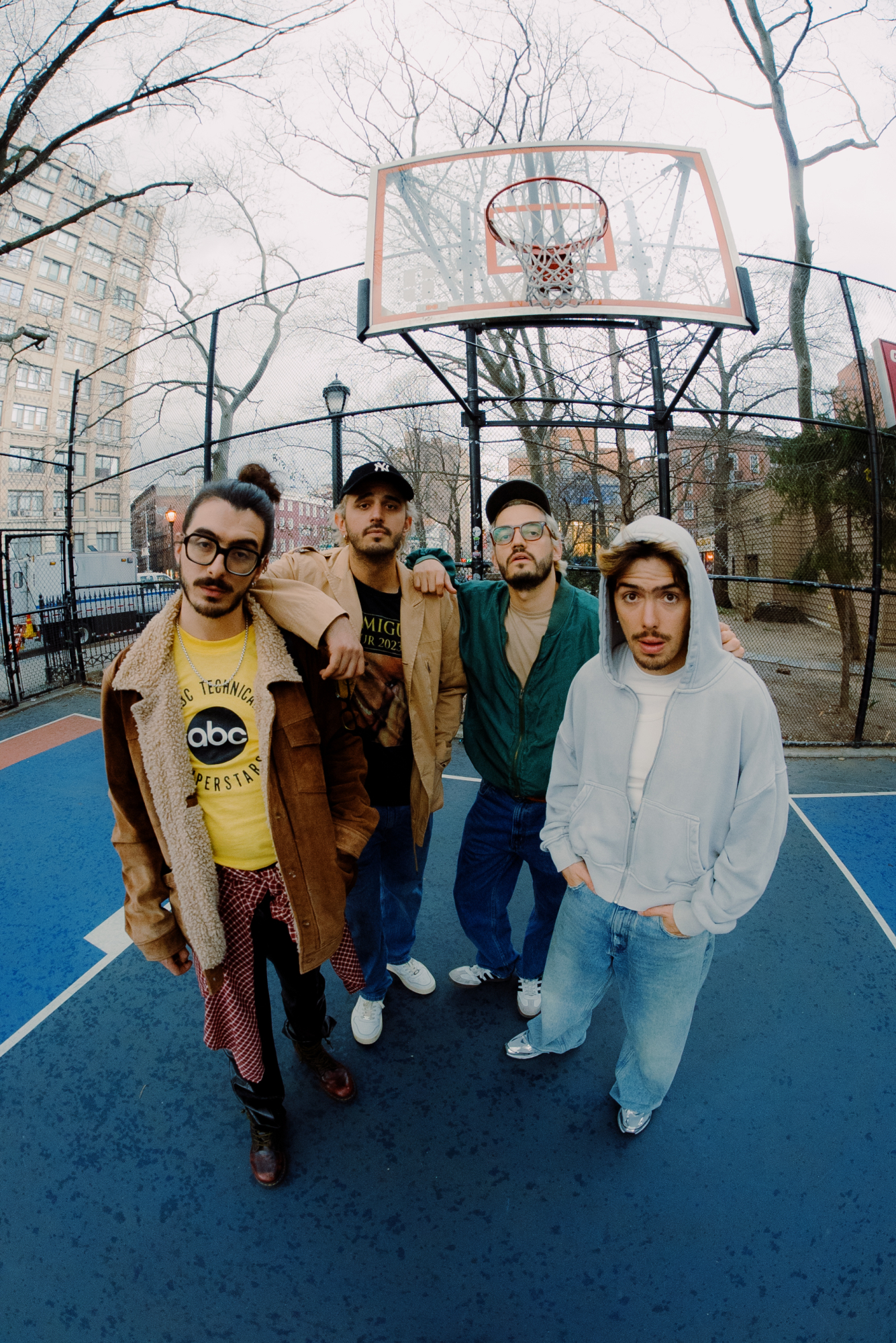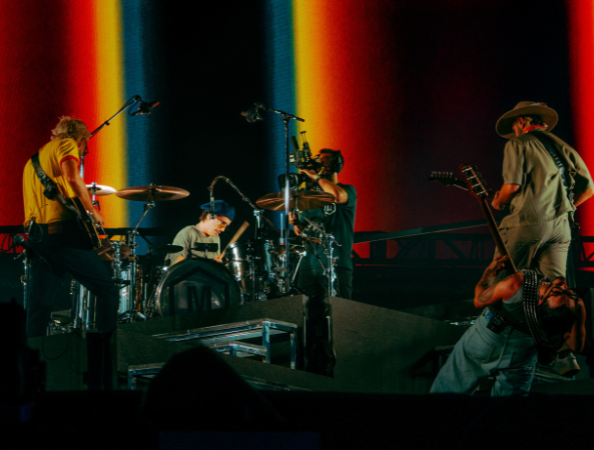'We're afraid of not changing': Morat

It was 2014, and Morat wasn't what it is today. It was a group of childhood friends—who remain friends today—making music, searching for their own sound, playing at parties and bars, while studying at university.
During those times they got together to play that year, Juan Pablo Villamil found the instrument that would give them the distinctive sound they were looking for. With the banjo as the protagonist, they finished "Mi nuevo vicio ," the song they were writing and that reached Paulina Rubio. And that changed everything.
They recorded it together, released it, and it became a worldwide hit, which was the springboard for Morat to become what it is today: the Colombian pop rock band with the greatest international reach.
More than a decade after their formation, Morat—which includes Villamil, Juan Pablo Isaza, Simón, and Martín Vargas— continues to impress not only with their music but also with the honesty with which they approach success, personal growth, and friendship.
They recently released Ya es mañana, their new album, in which the band members open the door to a time of transition filled with questions, decisions, and new beginnings . In an interview with EL TIEMPO, the band members reflect on what they've experienced, what's to come, and the importance of continuing to make music with authenticity.
What continues to surprise you about this career after so many years?
Juan Pablo Isaza (JPI): Sometimes you get the idea, which can be a bit toxic, that the good things that were meant to happen to us have already happened, like last year's stadium tour. Your mind always wants more, and at the same time that fear is present, the question arises: could good things still happen to us? And then you release new songs and see that people receive them with the same strength, with the same love as those we wrote years ago... and you feel a mixture of gratitude and enormous surprise. And you realize something unexpected and beautiful: that maybe our career is, in reality, just beginning.
Simón Vargas (SV): I'm still amazed at doing this with friends. The difference between experiencing this journey alone or in good company is enormous.
I'm still amazed at doing this with friends. The difference between experiencing this journey alone or in good company is enormous.
After so many years of traveling, composing, and making decisions together, how has your relationship changed?
JPI: We're like a four-part marriage. A fairly long-standing polyamorous relationship (laughs). We have cycles. And I think, of everything we've experienced together, what this life together has taught me the most is the acceptance we've gained of each other's personal cycles. There are times when the four of us are completely connected, and others when we're not. Sometimes there are sides, other times we're all overwhelmed, each fighting our own internal battles, which makes it difficult to find a group connection. Accepting that this is part of the journey, that we won't always be aligned, has been key. And communication is also, I think, what keeps us here today, happy, and still together.
You've always written with sensitivity, showing your vulnerability. What's it like to do that in an industry where there are still stereotypes about what a man should be like?
Juan Pablo Villamil (JPV): We just write what we feel at the end of the day. We don't overthink it or give it much thought. We've always said it, and it may sound like a cliché, but we're lucky that people like to hear what we want to write. I think, in some way, we've become aware that we portray slightly different emotions in our songs. So thanks for the question, because yes, it's something we can be proud of: contributing a certain emotional diversity, a certain representation of other ways of feeling. We've always done it very honestly, intuitively, and without strategy. And perhaps precisely for that reason, valuable things have come out: because we did it from the most genuine place possible.

"Ya es mañana" is the Colombian band's new album. Photo: Amanda Imm
What song do you feel best represents Morat today?
SV: I would say It 's Already Tomorrow . For me, the entire process of reflection that went into coming up with the album's concept was very profound and very slow, too. I think it began to develop from "If Yesterday Were Today," little by little, without us even realizing it. And in some way, that concept ended up permeating us as well: the very attitude of the album, this idea that 'it's already here,' that we have to start taking action for the future, even trying to reconcile ourselves with certain regrets from the past. Making the music that inspired us to have a band. And asking ourselves: what is our version of that? We've thought about it so much, we've been in that universe for so long, that I think it also became the stage we're experiencing as people. And I also feel that it aligns very well with our age, with what the album proposes. A song like " Before 30" says it directly: these are the questions that begin to appear at this stage of life, sometimes naturally, sometimes because the context pushes you to ask them.
If you could travel back in time and talk to who you were when you started the band, what would you say?
SV: I don't think anything. I didn't want to ruin the surprise. Part of the magic was not knowing what was coming.
JPI: Same. All the mistakes were worth something, and so were the successes. Everything went as it should.
I feel like there's a lot of pressure, at least we've felt it, for people to continue to perceive us as the same old thing.
This new album sounds different. The voices are more defined, there's more individuality. Were you afraid of changing?
JPI: We're more afraid of not changing. I feel like there's a lot of pressure—at least we've felt it—from people continuing to perceive us as the same old thing. It's a comment that's floated around a lot on social media over time. And although we feel like we make very different songs, that we play with rhythms, structures, and ideas, there's something that inevitably gives unity. And that's the voice. The voice is a very strong mark on a song's identity, and our voices are easily recognizable. Plus, there's something we discovered and value greatly: when the four of us sing together, it generates a very powerful emotion, something very much our own. But of course, it also automatically stamps everything we do: it sounds like Morat. So the challenge with this album was precisely that: being aware that this tool exists, that it's valuable, but also asking ourselves how to make it sound different. How to use our voice without repeating ourselves, without falling into the same old thing.
How did you experience that creative process internally? Was it a deliberate decision or something that just happened?
JPV: We made peace with something important. I fully understand the saying "if it ain't broke, don't touch it," but I also think we have a very powerful advantage, one that many bands also have, and that's the songwriting process. From the beginning, our songs are born from within. Obviously, there are people involved along the way, but almost always one of the four is deeply involved in the origin of each song. And the fact that this has been maintained in all our albums gives us a lot of peace of mind. Because, no matter what happens with the production, the sound, the arrangements, the DNA remains the same. That internal seal, that common root, allows us to experiment without feeling like we're betraying who we are. And that's why, even if it sounds different, it still sounds like us. And that's given us a lot of freedom when it comes to innovating on this album.

Morat in concert Photo: Amanda Imm
What would you like to be said about Morat in 30 years?
JPV: We were a Colombian band of conscious musicians. For us, those three words say it all. Band, because we're a team. Colombian, because it represents us and we wear it with pride. Musicians, because music is at the heart of everything. And conscious, because we seek to reflect a true sensitivity toward our environment in our lyrics and actions.
If this moment in your lives were a chapter, what title would you give it?
Martín Vargas (MV): 'It's already tomorrow.' It sums up the attitude we've been following lately: living knowing that every day is an opportunity to do something for your dreams, to change what you don't like, to pursue what you want to be.
JPI: I agree with Martín. I also want to add that we don't have everything figured out yet, but we're on the right path. And that's the chapter.
JPV: 'A new hope.' I feel like we're at a point where it's inevitable to feel like life is lining up for us to start over. As if there's a very important resurgence of what we've always wanted to do. As if we're charging all our emotional energy toward something big, as if something is about to happen.
SV: 'New horizons.' We're in a time when everything feels more flexible. I feel like this is a moment when the limits of everything we've been doing for years have become more visible, as if they're suddenly becoming more clearly delineated: the limits of territory, style, even individual possibilities. And at the same time, I feel like we're now entering a stage where everything that once seemed fixed is becoming more flexible.
eltiempo

%3Aformat(jpg)%3Aquality(99)%3Awatermark(f.elconfidencial.com%2Ffile%2Fbae%2Feea%2Ffde%2Fbaeeeafde1b3229287b0c008f7602058.png%2C0%2C275%2C1)%2Ff.elconfidencial.com%2Foriginal%2Fb0a%2Faa2%2F6e6%2Fb0aaa26e626c1010324aec887eec8b1f.jpg&w=3840&q=100)
%3Aformat(jpg)%3Aquality(99)%3Awatermark(f.elconfidencial.com%2Ffile%2Fbae%2Feea%2Ffde%2Fbaeeeafde1b3229287b0c008f7602058.png%2C0%2C275%2C1)%2Ff.elconfidencial.com%2Foriginal%2Fc38%2Fe3e%2Fffd%2Fc38e3effd3f522e20c1d3a5ea879598e.jpg&w=3840&q=100)


